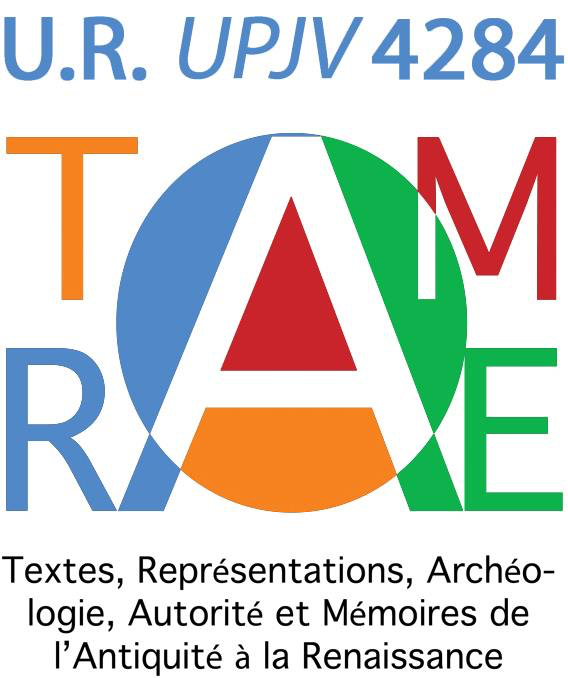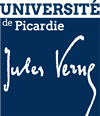Presentation - TRAME (English)
Vous êtes ici : Accueil > Présentation
General presentation
TrAme (Text, Representation, Archaeology, Authority and Memory, from the Antique through the Early Modern Periods) brings together scholars working in the domains of the humanities and the social sciences within a research group. The group includes specialists in the fields of literature, history, archaeology and history of art from the classical through the early modern periods. TRAME is incorporated within the University of Picardy’s Social Sciences research programme: ‘Heritage, Culture, Transmission and Languages’, and presents an interdisciplinary, diachronic perspective. The laboratory was created on the 1st of January 2008 following the combination of two preexisting groups: CEMAR (Centre for Medieval and Renaissance Studies, UPJV) and LAHM (Laboratory of Archaeology and Medieval History, UPJV), whose members were joined by the University’s specialists in the classical period. Research within the laboratory currently follows three structural axes: ‘Space and Power: Challenges and Dynamics’, ‘Humanism: Literary Practice and Religious History’ and ‘Objects, Materiality and Representation’.
Themes and Fields of research: some history
From the foundation of the laboratory in 2008 under the direction of M. Perrin and during its development under the direction of M. Paoli through 2017, the work of the laboratory was divided into two major axes in order to encourage synergy: ‘Space, Power and Society’ and ‘Texts, Cultures and Spiritualties’. The purpose was to bring together approaches from the disciplines of history, including archival work; history of art; archaeology; palaeography; literature and philology from the classical through the medieval and early modern periods. One of the principal aims of TRAME is to allow for historic and literary material – texts, images and documents – to be examined according to the techniques appropriate to each discipline in relation to other related disciplines.
From 2017, while retaining its characteristic interdisciplinary and diachronic approaches, TRAME undertook a renewal of its themes and structures in order to reflect the development and new orientations of the research pursued by members of the laboratory. The first branch, ‘Space and Power: Challenges and Dynamics’, includes the fields of classical and medieval archaeology as well as economic, social, political and religious history. The second branch, ‘Humanism: Literary Practice and Religious History’ seeks to incorporate varied approaches – philological, literary, philosophical or historic – to the study of texts and differing cultural regions (classical Greece and Rome, the medieval world, and Northern and Southern Europe) from the classical through the early modern periods. The final branch, ‘Objects, Materiality and Representation’ unites literary scholars, historians and historians of art whose work stems from the study of material culture in relation to the texts or visual artefacts examined.
From 2017, while retaining its characteristic interdisciplinary and diachronic approaches, TRAME undertook a renewal of its themes and structures in order to reflect the development and new orientations of the research pursued by members of the laboratory. The first branch, ‘Space and Power: Challenges and Dynamics’, includes the fields of classical and medieval archaeology as well as economic, social, political and religious history. The second branch, ‘Humanism: Literary Practice and Religious History’ seeks to incorporate varied approaches – philological, literary, philosophical or historic – to the study of texts and differing cultural regions (classical Greece and Rome, the medieval world, and Northern and Southern Europe) from the classical through the early modern periods. The final branch, ‘Objects, Materiality and Representation’ unites literary scholars, historians and historians of art whose work stems from the study of material culture in relation to the texts or visual artefacts examined.
Organisation
Director : Arnaud Timbert
Assistant director : Michela Costanzi
Treasurer : Nathalie Catellani
Secretary : Nathalie Catellani
Website : Sandrine Mouny
Assistant director : Michela Costanzi
Treasurer : Nathalie Catellani
Secretary : Nathalie Catellani
Website : Sandrine Mouny
Laboratory council
Camille Ambrosino (postgraduate representative), Laurence Boulègue, Maria Louisa Bonsangue, Lucie Claire, Véronique Dominguez, Marie-Laurence Haack, Pascal Montaubin, Sandrine Mouny (Facebook coordinator), Sara Nardi-Combescure, Pauline Secchioni (postgraduate representative), François Seguin (Amiens-Métropole), Philippe Senechal, Olivier Szerwiniack, Marie-Sophie Winter.

TRAME - EA 4284
Pôle Citadelle
bureau E226
10 rue des Français Libres
80080 AMIENS, France
Tel. (+33) 3 64 26 83 56
 contact us
contact usDirector
Laurence BOULÈGUE
Assistant director
Pascal MONTAUBIN
Unit council
Laurence BOULÈGUE
Maria Luisa BONSANGUE
Nathalie CATELLANI
Michela COSTANZI
Lucie CLAIRE
Julie COLAYE
Véronique DOMINGUEZ
Julien GOEURY
Marie-Laurence HAACK
Pascale MONTAUBIN
Sandrine MOUNY
Marie QUILLENT
Philippe RACINET
François SEGUIN
Arnaud TIMBERT
Web master
Alice BOURGOIS


